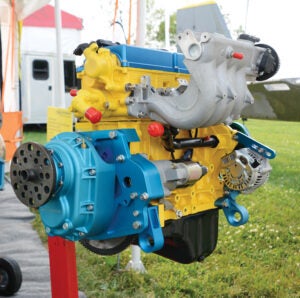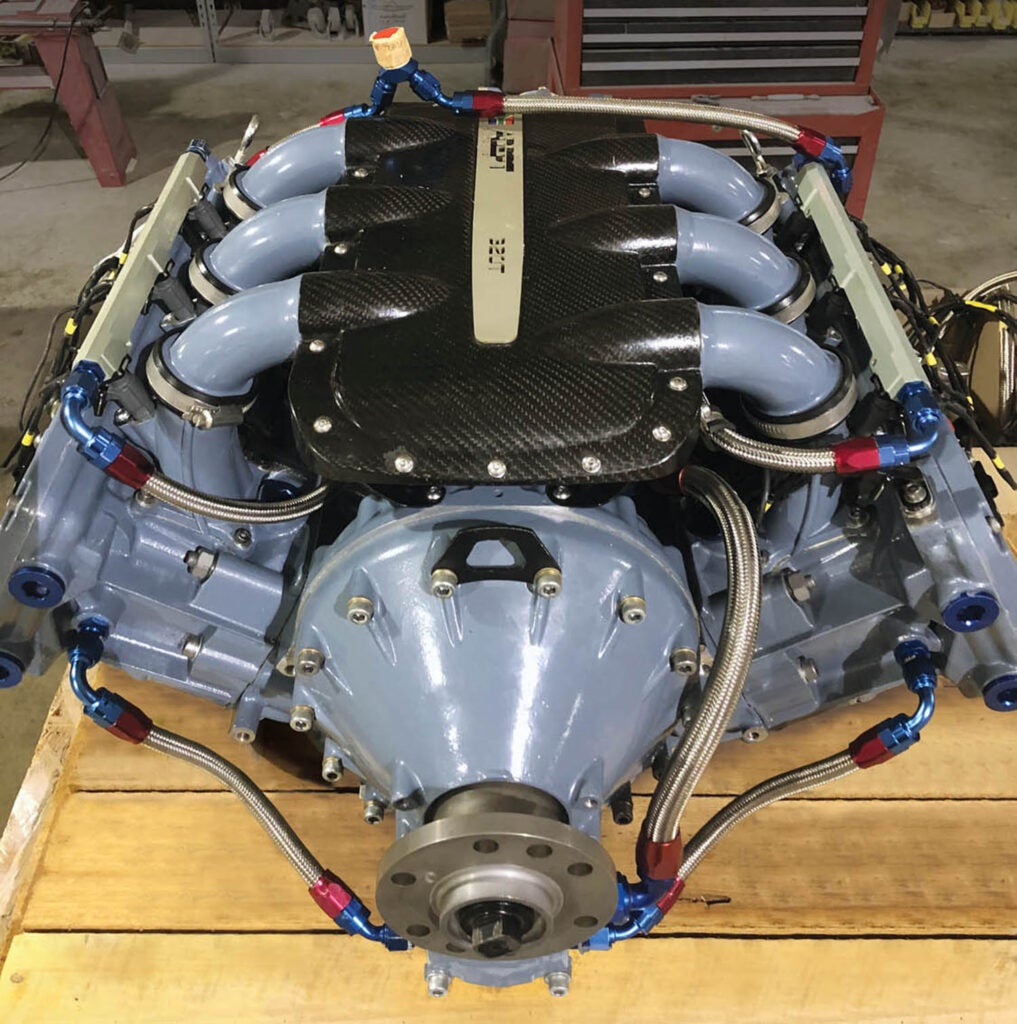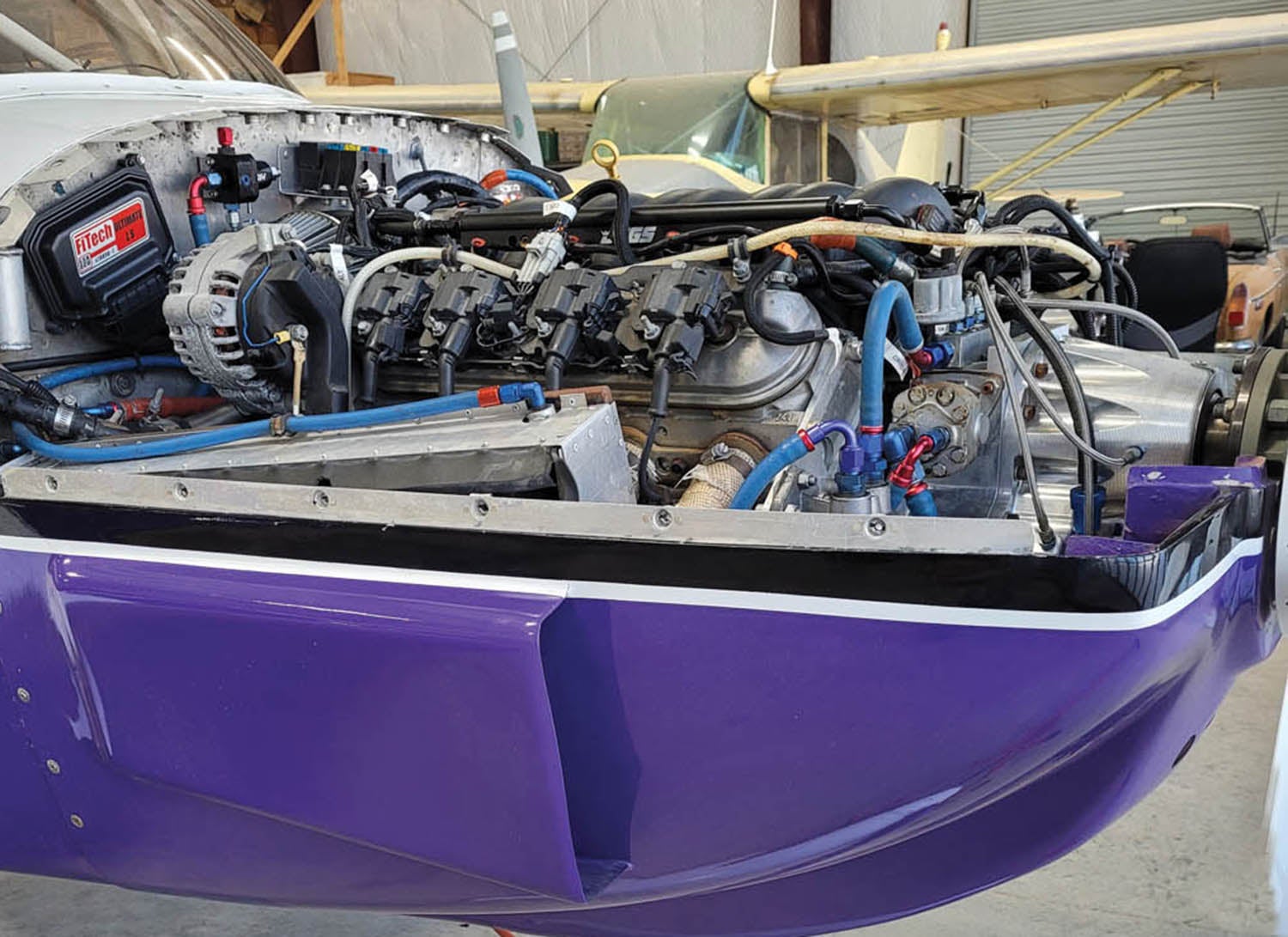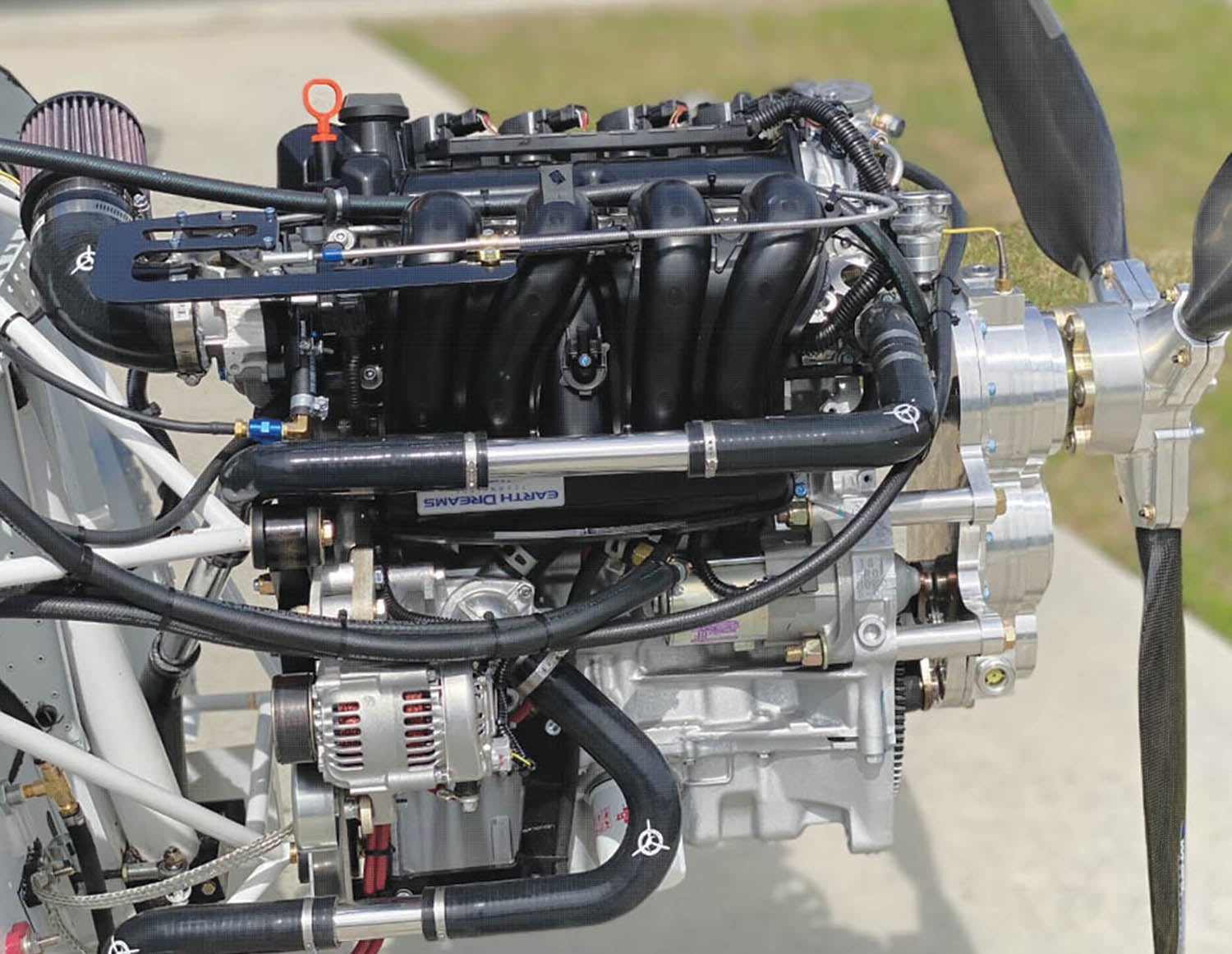Aeromarine
The Aeromarine V-Twin was released in 2021 for use in Aeromarine’s Merlin Lite ultralight, but with 60 hp on tap we thought we’d mention it here for those looking for a minimal engine in a flyweight plane. It’s built from the Polaris ATV powerplant so it enjoys economies of scale, which helps explain its $7250 price for the engine only, or $10,750 as part of a firewall-forward kit including PSRU gearbox, propeller, spinner, engine mount hardware and cowling for a Merlin Lite application.
Technically, the V-Twin is water-cooled, four-cycle, 800cc, with electronic fuel injection, electronic ignition and electric starter. Aeromarine principal Chip Erwin says the V-Twin has been proven in rough duty in many thousands of Polaris ATVs and is so low cost it is replaced rather than overhauled.
AeroMomentum

Bucking the nothing new trend this year is Mark Kettering at AeroMomentum. Last year AeroMomentum offered 14 engines; this year there are 17 with all three of the new engines sporting turbos. Two of these, the AM13 and AM15, are derivatives of the familiar, compact engines that got AeroMomentum started. But the third, the AM20T, muscles out 260 hp and is getting AeroMomentum noticed by the mainstream E/A-B crowd. Actually the AM20T has been around for about a year, but it’s turned into such a market hit it seems new this year.
Thus, for 2023 AeroMomentum’s lineup ranges from a 1000cc three-cylinder, 1300cc and 1500cc four-cylinders to that turbocharged 2000cc four-cylinder.
There are many variations of the AeroMomentum engines because the 1.3- and 1.5-liter four-bangers can each be had in upright or heavily canted form, plus each offers three states of tune. The upright or canted options are strictly for packaging ease in different airframes and make no difference in power output (but do in price). The power differences come from either stock engines or those with AeroMomentum’s more aggressive camshaft and head work.

AeroMomentum engines begin with brand-new automotive long blocks. Suzuki is the source of the 1300 and 1500 engines, while the others are non-Suzuki and cannot be revealed as part of the sourcing agreement. All engines are built from all-new parts.
All AeroMomentum engines use a helical, spur-gear prop reduction gearbox. It features custom 8620 alloy gears and like many of AeroMomentum’s other parts, is designed in-house (there’s no lack of engineering experience at AeroMomentum with Cal Poly, Harvard, UMass Lowell and NASA in the resume). Parts are forged, machined, heat-treated and otherwise produced by out-of-house vendors then assembled at AeroMomentum. The highest time gearbox so far logged 5500 hours in an airboat with no issues. AeroMomentum also offers various firewall-forward supporting parts such as engine mounts and cowlings, plus their own Aero-Graph engine monitor.
As AeroMomentum’s business has grown it has brought on some unusual conditions. “We’re seeing more action from the RV guys,” says Kettering, “and the AMT 20T order book is really large. We’re even discouraging orders at the moment…[we’re] limited on space and time [and] if we try to grow too quickly it hurts quality.” Another is that the AM20T is almost too lightweight. “It packages like an O-320 Lycoming, has the weight of an IO-360,” says Kettering, and the power of a 540. At about 100 pounds less than the latter engine it’s simply too light for the RV-10, for example.
ADEPT Propulsion Technologies
ADEPT is a South African company working to bring a next-generation piston engine to the world market. While the engine took flight as a prototype over five years ago and is currently in limited production, the ADEPT initiative remains in its early days.
The ADEPT mill is a clean-sheet design, a nearly flat, 3.2 liter, 120° V-6 featuring the expected FADEC engine control. More unexpectedly, it sports a knock sensor allowing nearly any fuel, from 100LL to mogas laced with ethanol or methanol. Power is rated at a base 260 hp, then ranging through several steps to 360 hp in turbocharged form. Future engines are in development, says ADEPT; they will offer up to 420 hp.
Other features are liquid cooling, dry sump oiling with piston squirters, billet crankshafts and connecting rods and forged pistons, plus the same bore and stroke across all power levels. The differences are in the camshafts, injectors, computer mapping and other tuning factors. Turbo’d engines use a single turbo.
ADEPT, who we’re continuing to rate as in the late prototyping stage, has already delivered a handful of engines in the U.S. to well-heeled, fast-glass aircraft customers. ADEPT was hoping to have one of these flying in 2022 but early 2023 is now more like it according to ADEPT’s North American representative Lee Brinley. He also reports “real progress” in 2022 including generating several new engine mounts and cowlings, plus plenty of engine management integration work with Dynon (nearly complete) and Garmin (getting started).
Advantages to the ADEPT engine center around increased efficiency (less weight, more power), lack of shock cooling and other liquid cooling advantages. Smoothness, along with the already demonstrated capability to pass possible future emission regulations with an optional catalytic converter—now there’s a general aviation first—are also cited. The engine is also a foot narrower than a 550 Continental, so reduced frontal area is another plus for those making a new cowling. Not recommended for the casual kit builder, the ADEPT is an option for early adopters with the means to support something new.
Auto PSRU’s
Auto PSRU’s continues to massage their spur gear gearbox kits with a near total focus on fitting the Chevy LS-3 V-8 to Van’s RV-10. Thus, work continues on Auto PSRU’s own in-house RV-10. Originally fitted with an LS-1 Chevy, Auto PSRU’s has moved on to the LS-3 because it makes an additional 60 hp with no weight or packaging penalties. It’s also more contemporary to what Chevy has on sale these days.
Naturally this has kept Auto PSRU’s busy improving the exhaust, cooling and other accessories. One interesting move was back to the stock engine-driven water pump, the previous electric pump proving adequate in flight but not up to the job during extended taxiing. The cowling exit has also been enlarged.

Plan on three to four months for Auto PSRU’s to gin up a PSRU. A complete firewall-forward package with PSRU, centrifugal clutch, engine, fuel injection, ignition, alternator, cowling and so on is their standard offering.
Subaru and Mazda rotary kits are also listed. The Subaru business has fallen well off as the supply of engines is now very limited; the Mazda 13B kits see sporadic interest and are often a co-production with Atkins Rotary/American Rotary in Oregon.
All said, “We handle from about 150 to 550 horsepower,” says Stuart Davis of Auto PSRU’s. All their gearboxes feature self-contained, pressurized oiling and the ability to accommodate constant-speed propellers. And with custom gear ratios and adapters they’ll work with almost any engine, and Auto PSRU’s significant custom fabrication ability is a boon to builders venturing off the beaten path.
Viking Aircraft Engines
News from Viking is their 150-hp, 1.8-liter engine has become a great seller, rivaling their best mover, the 1.3-liter. That and customer Dave Tillema landed in all of the lower 48 states on his way to AirVenture this year. Using a Zenith CH 750 Cruzer fitted with a Viking V-130, Tillema did the feat in 10 days, 70 hours flight time and never added oil.
Viking specializes in late-model Japanese auto conversions, giving them the latest modern engine design features such as direct injection and tight assembly tolerances. Their four-engine lineup is based on current production, multi-valve, liquid-cooled, computer-controlled auto engines from Honda and Mitsubishi. Viking starts with low mileage used engines with “full background and tracking” to keep costs low and inventory up. TBO is given at 2000 hours and replacement engines are understandably low-cost.
Furthermore, backed by automotive production levels, Viking prides themselves in keeping a large enough inventory to offer next-day shipping (when possible these days) of their several firewall-forward kits. They certainly haven’t had the supply issues associated with low-volume production aviation engines.

Viking’s entry-level offering is a 90-hp version of a three-cylinder, DOHC, 12-valve Mitsubishi engine. Fitted with Viking’s own gearbox (climb or cruise gear ratios can be ordered; it can also work in pusher applications) the combination weighs but 159 pounds and posts a particularly muscular low-end torque curve when augmented with the lower of the two gear sets. This engine is aimed particularly at the Zenith CH 701.
For its best-selling 130-hp engine, Viking starts with the direct-injected Honda Fit four-cylinder powerplant. Geared with a fairly steep 2.33:1 ratio, and also with unexpectedly good low- and mid-range thrust, the combination weighs 220 pounds. Because the Fit engine has its exhaust manifold integral with the cylinder head the engine is not a good candidate for turbocharging, but the gasoline direct fuel injection (fuel is shot directly into the cylinders) gives in-cylinder cooling allowing a high 10.8:1 compression ratio for increased efficiency. By venting crankcase blowby to the atmosphere Viking escapes the valve deposit issues found in automotive GDI applications.
The 150-hp, 1.8-liter engine is another Honda four-banger. It uses port fuel injection and has gained considerable popularity because it offers a 20-hp bump for just 24 more pounds and not that much more cost than the 1.3 liter.
Viking’s top offering is the 195-hp version of the turbocharged Honda Accord engine. Naturally this also gives a fat low-end torque curve (there’s nearly 440 pound-feet of torque at the prop at only 1250 rpm). This engine is also augmented by Viking’s gearbox and Honda’s gasoline direct injection. Weight naturally rises to 260 pounds but either 100LL or mogas can still be run. As with other modern, small-displacement, liquid-cooled engines, Viking specifies lead-scavenging additives with these engines if run on 100LL avgas.
Viking supplies firewall-forward kits and supporting parts to support these engines mainly in Zenith, Kitfox and RANS airframes although they have additional offerings. Viking also notes they’ve been traveling more to help customers with installs, final inspections and first flights along with assisting those who can bring their project to their Edgewater, Florida, facility.
| Model | Drive Type | Horsepower | Weight | Price |
|---|---|---|---|---|
| Aeromarine | ||||
| 700E Twin | geared | 60 hp @ 6200 rpm (3 min), 56 @ 5800 rpm continuous | 121 lb w/ carburetors, fuel pump, dual CDI | $13,656 w/ exhaust, oil tank/cooler |
| AeroMomentum | ||||
| AM10 | geared | 85 hp @ 6000 rpm – upright | 139 lb w/ PSRU, starter, alternator, ECU | $9995 (production hold) |
| AM13u standard | geared | 100 hp @ 5800 rpm – upright | 170 lb w/ PSRU, starter, alternator, ECU | $9,995 |
| AM13h standard | geared | 100 hp @ 5800 rpm – low profile | 170 lb w/ PSRU, starter, alternator, ECU | $11,495 |
| AM13h camshaft, head porting | geared | 112 hp @ 5800 rpm – upright | 170 lb w/ PSRU, starter, alternator, ECU | $13,995 |
| AM13u camshaft, head porting | geared | 112 hp @ 5800 rpm – low profile | 170 lb w/ PSRU, starter, alternator, ECU | $15,995 |
| AM13h camshaft, head porting, high rpm | geared | 126 hp @ 6500 rpm – upright | 170 lb w/ PSRU, starter, alternator, ECU | $15,995 |
| AM13h camshaft, head porting, high rpm | geared | 126 hp @ 6500 rpm – low profile | 170 lb w/ PSRU, starter, alternator, ECU | $15,995 |
| AM13T | geared | 140 @ 5800 rpm – upright | 200 lb w/ PSRU, starter, alternator, ECU | $14,995 |
| AM15u standard | geared | 117 hp @ 5800 rpm – upright | 185 lb w/ PSRU, starter, alternator, ECU | $11,495 |
| AM15h standard | geared | 117 hp @ 5800 rpm – low profile | 185 lb w/ PSRU, starter, alternator, ECU | $13,495 |
| AM15u camshaft, head porting | geared | 131 hp @ 5800 rpm – upright | 185 lb w/ PSRU, starter, alternator, ECU | $15,495 |
| AM15h camshaft, head porting | geared | 131 hp @ 5800 rpm – low profile | 185 lb w/ PSRU, starter, alternator, ECU | $17,495 |
| AM15u camshaft, head porting, high rpm | geared | 147 hp @ 6500 rpm – upright | 185 lb w/ PSRU, starter, alternator, ECU | $15,995 |
| AM15h camshaft, head porting, high rpm | geared | 147 hp @ 6500 rpm – low profile | 185 lb w/ PSRU, starter, alternator, ECU | $17,495 |
| AM15T turbo | geared | 160 @ 5800 rpm – upright | 215 lb w/ PSRU, starter, alternator, ECU, turbo | |
| AM20 | geared | 180 @ 6000 rpm – upright | 285 lb w/ PSRU, starter, alternator, ECU | |
| AM20T turbo | geared | 260 hp @ 6000 rpm – low profile | 285 lb w/ PSRU, starter, alternator, ECU, turbo | $24,495 |
| ADEPT Airmotive | ||||
| 260N V-6 | geared | 260 hp @ 5500 rpm, normally aspirated | 306 lb w/ radiator, alt, EFI, starter, dry sump system | $60,000 |
| 280N V-6 | geared | 280 hp @ 5500 rpm, normally aspirated | 306 lb w/ radiator, alt, EFI, starter, dry sump system | $65,000 |
| 300N V-6 | geared | 300 hp @ 5500 rpm, normally aspirated | 306 lb w/ radiator, alt, EFI, starter, dry sump system | $70,000 |
| 320T V-6 | geared | 320 hp @ 5500 rpm, turbocharged | 340 lb w/ radiator, alt, EFI, starter, dry sump system | $85,000 |
| 360T V-6 | geared | 360 hp @ 5500 rpm, turbocharged | 340 lb w/ radiator, alt, EFI, starter, dry sump system | $90,000 |
| Auto PSRU’s | ||||
| LS-3 Chevrolet | geared | 360 hp @ 4500 rpm (centrifugal clutch) 1.666:1 ratio | 580 lb installed, typical, complete | $44,800 FF, est. call |
| 2.5L Subaru | geared | 150 hp @ 5000 rpm (centrifugal clutch) 1.859:1 ratio | 355 lb installed, typical, complete | $33,100 FF, est. call |
| 3.0L Subaru | geared | 230 hp @ 5000 rpm (centrifugal clutch) 1.859:1 ratio | 375 lb installed, typical, complete | $33,400 FF, est. call |
| Viking Aircraft Engines | ||||
| V-90 Mitsubishi | geared | 90 hp @ 5800 rpm | 160 lb w/ PSRU, exhaust, alternator | $9,995 |
| V-130 Honda Fit | geared | 130 hp @ 5400 rpm | 215 lb w/ PSRU, exhaust, alternator | $11,995 |
| V-150 Honda 1.8 liter | geared | 150 hp @ 5800 rpm | 239 lb w/ PSRU, exhaust, alternator, starter, ECU | $15,500 |
| V-195 Turbo Honda | geared | 195 hp @ 5400 rpm | 260 lb w/ PSRU, exhaust, alternator, starter, ECU | $18,500 |













